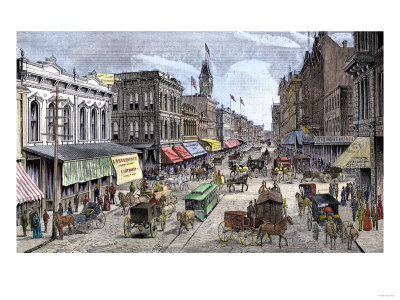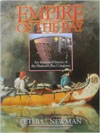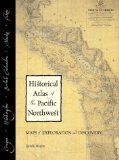United States
Oregon
Astoria ° Coos Bay ° Hollering Place ° Portland
When white settlers began to arrive, Indians inhabited all of present-day Oregon. Unfortunately, as they did in most of the America's, white settlers considered the Indians to be nomads who drifted purposelessly from place to place.
In reality, Oregon Indians moved from winter to summer villages and encampments to hunt, fish, and gather food. In turn, Indians did not understand white customs and traditions and white settlers obviously did not understand Native Americans and their traditions. As a result, Indian-white relations throughout North America were marked by frequent skirmishes.
In 1543, Spanish explorers sighted the Oregon Coast near the Rogue River, but interest didn't begin growing significantly until 1778, when Captain James Cook began trade along the Oregon Coast. Publication of his journals about his voyages spurred great interest in future trade and he was followed in 1793 by Alexander McKenzie who lead an expedition over the Canadian Rockies to the Pacific, then by Lewis and Clark's expedition, which reached the mouth of the Columbia River in 1805. In 1811, The Pacific Fur Company, founded by American financier John Jacob Astor, established a string of trading posts along the lower Columbia and in 1818, the United States and Great Britain agree on "joint occupancy" for the Oregon Country. By 1821, The Hudson's Bay Company had acquired a fur monopoly for all of British North America after merging with the North West Company.
Alta California , October 1, 1849, San Francisco, California
"Whether we view Oregon as the early American home of the Pacific adventurer, combining the advantages of a priority of claim to the attention of the world, and liberal investment of capital and labor on its fertile, soil, or, ad a country redolent with the best gifts of nature and, at this time, in the possession of an enterprising and industrious people, we cannot built concede insuperable advantages to result from its neighborly and kindred relation to California. Not without a kindling of envy, it must be confessed, do we view the magnificent prospects and admit the favored position of our fair sister territory; the reflection, however, furnishes a source of pride, while it illustrates a great truth: that the glittering treasures of our soil shall speedily build up an adjacent mighty and populous state.

"If we have eclipsed with our sudden and dazzling riches the sturdier wealth of Oregon — if, by the seductive influence of our golden opulence, we have shaken the basis of its prosperity, by striking panic to her industrial occupations, momentarily disorganizing society and paralyzing the strong arm of labor, there has a crisis arrived, and there will a reaction follow, far more effective for her good, and immeasurably more beneficial to her interests than if her rival, California, had never disclosed the glided bait to tempt the loyal of her clear-headed, stout-hearted, and strong-fisted yeomanry.
"The people of Oregon are temperate, frugal and industrious, and the productions of Oregon are those of a heaven-blessed clime. Her agricultural resources are along capable of sustaining a great people, and these, together with her numberless attributes of wealth, are, by the proximity of a growing state—improverished in these generous qualities by mines and their influence—to be the more certainly and speedily developed . . . "
By 1851, paying gold mines were discovered in the Rogue River Valley, which lead to the establishment of cities and towns in Southern Oregon wherever they examined these streams. In 1849, some Oregonians found gold at the old fort of Rogue River, but it was not worth working and was never reported as a discovery.
Then gold was discovered first in Josephine County by a party of sailors who deserted their ship at Crescent City on hearing of the discovery in the Rogue River valley, and made their way across the mountains to the head waters of the Illinois river, and commenced prospecting in the vicinity of the old mining camp of Waldo. Here they struck "pay dirt," so rich as to attract many others to the place, which from that date on went by the name of "Sailor Diggins."
Around 1852, gold dust was discovered in the sea beach sands in Coos and Curry Counties. In 1853 more than a thousand men washed gold out of the black sand along the sea shore south of Coos Bay. This gold is supposed to have been washed down into the ocean by the coast rivers; and every big storm carried back in a fresh lot of gold dust within the reach of the miner who has patience enough to work the sands over often enough to get the gold dust out of them. Beach gold is so fine that the use of a microscope was often necessary to detect it; but with the use of quicksilver, it could be recovered in quantities. Hundreds of machines have been invented and patented to save that sea beach gold; and yet none of them seems to have much advantage over the original methods of the first miners using the quicksilver. The sand in which this sea beach gold is found exists not only on the present day sea shore but is also found on the ancient sea shore line forty miles back in the interior on the upper Coquille river.
January 28, 1856, Daily Alta California, San Francisco, California
Purchase of the Hudson Bay Company's Territory

This is evidently the age of annexation. Every mail which comes from the Atlantic, brings us some new rumor of negotiations in progress for the enlargement of the "area of freedom." A short time since, we were informed that there was a prospect of the purchase of the Russian Possessions on the northwest coast, then the States of Chihuahua and Sonora, and the Territory of Lower Caliornia, were to be incorporated in our territory and noew we are informed on the authority of the New York Herald, that the President in his message will recommend the purchase of the rights and possessions of the Hudson Bay Company in Oregon territory. The Herald publishes very interesting condensed history of the possession of the company, and the negotiations which have heretofore been in progress for the sale to the United States. Upon the supposition, that the Herald's statement is correct, and that there is a probability of the acquisition of this territory, every thing in relation to it will be of interest to the people of California and Oregon, who will be more immediately affected by its purchase. The Herald says:
When the Oregon treaty was concluded special reservations were made in favor of the Hudson Bay Company, and its hunters. They were confirmed in their claim to navigate the Columbia river, and all the rivers flowing into it from the point at which the forty-ninth parallel crosses the same; and their possessory rights in the territory south of the forty-ninth parallel were pronounced safe from molestation. Thus it came about that the actual sovereignty of that country was in British subjects, while the nominal sovereignty appertained to the United States. The experience of the Oregon dispute alone taught both parties the danger and inconvenience of an arrangement of this nature, nor were their anticipations long un-realized. Before the treaty had been in force half a dozen years, conflicts arose on its interpretation the Hudson Bay Company claiming more than the United States were willing to allow, and the latter on their side narrowing their occupation of the term "possessory rights," within smaller limits than the western hunters chose to recognise. It was clear, as long ago as 1849, that unless measures were taken to avert future trouble, the peace of the two nations might be disturbed by the consequences of the anomalous position of the Hudson Bay Company in Oregon.
 |
| Fort Vancouver, a Hudson Bay Company. North Bank of Columbia River. Gustav Sohon. |
A negotiation was accordingly set on foot by Sir George Simpson, the Governor of the Hudson Bay Company, in order to sell the rights of the company to the United States. In 1851, he valued the buildings and trade of the Hudson Bay Company in Oregon at $2,330,000, exclusive of the joint right to navigate the Columbia. The chief items which went to make this sum were Fort Vancouver, at the head of ship navigation on the Columbia, which, with its dependent mills and farms, was valued at half a million of dollars. Smaller forts and farms Forts Champooick, Disappointment, Umpqua, Nez Perces, Colville, the Camelitz Farm, the Nisqually settlement, etc., were set down at various sums, from $50,000 to $15,000. The cattle ranges throughout the counrry on which the company was used to pasture is flocks and herds previous to the treaty, were valued in round terms at half a million; and the good will of the business, including the trade with the Indians, was set down at a million of dollars.

All this Sir George offered to sell for one million less than one half the stated valuation. We presume the offer is still open to the acceptance of the Government.
It should be accepted without hesitation. Considered in a financial light, the sum asked is small. The cost of buildings alone, at the seventeen forts and farms occupied by the Hudson Bay Company, was $450,000; at least Sir George Simpson says so, and there cannot be much exaggeration. In 1843, the trade at Fort Vancouver yielded a net profit of $85,000, which is alone more than the interest of a million. And if the strip of barren land on the Mexican frontier was worth ten million, the exclusive navigation of the Columbia and the undivided possession of Oregon are surely worth one.

But these are peddling reasons. The United States should hasten to acquire the right and possession of the Hudson Bay Company because in a few years the possession of the mouth of the Columbia, and the command of the whole southern country, may be tantamount to the control of the Northern Pacific. Fort Vancouver is destined to be the New York of Oregon. A mere trading post at present, where settlement is not encouraged by the company, it is hardly known: but let it pass under the United States' flag, and ten years will not elapse before healthy efforts are made to build a great town there. As was remarked before, the river is navigable for ships of large burthen up to the fort; very little expense would build wharves at which they might discharge cargo within a stone's throw of the dwelling houses. The back country is a rich prairie, wiih well wooded patches, and plentifully intersected by streams. The climate is excellent: men live to a prodegious age there. It is certain that were it thrown open to settlers, an influx of immigration would flow thither, and the fame and wealth of San Francisco might soon be eclipsed. We hope, therefore, that nothing will stand in the way of a speedy purchase of the property.
Gold aided in
the established of Oregon's towns and Portland was officially "founded" in 1843. The first transportation system in Portland was the Columbia River and the Willamette River when the waterfront was thickly populated with sailing ships and steamboats. The columns of the Oregonian in 1861 and 1862 covered the gold hunting tales and success stories in Eastern Oregon.
Oregonian, July 23, 1861: There are now arriving in this city by steamer, stage and private conveyance hundreds of miners on their way to the mines. The Julia on Monday was crowded. We learn from persons from Yreka that the exodus from Northern California is immense. Parties are constantly going to the mines by way of Klamath Lake. The Red Bluffs Independent says there is a perfect stampede from that section. Many from the Upper Willamette go by the different roads across the Cascades. By the Julia last evening $28,000 came down from the Nez Perces mines.
Steamers from San Francisco bring large numbers bound for the mines and the overland stage comes every day loaded with miners. Besides, we have reason to believe, that numbers of miners from California take the route east of the mountains to Walla Walla. There will probably be nearly or about 5,000 persons at the mines by October. Tracy & Company brought down last night, per steamer Julia, $12,000 in gold dust.
Joseph "Bunco Kelly"
Like San Francisco's shipping history, Portland has a dark era that began in the late 1800s with Joseph "Bunco" Kelly, a hotelier notorious for kidnapping young men and selling them to ship captains. Many bar owners and hotel operators relied on this shanghai trade to supplement their businesses, and Kelly was one of the best. Paid by unscrupulous captains to intoxicate potential crew members, Kelly would deliver his drunken quarry to waiting ships. The unfortunate men would wake up the next day - stranded at sea and forced to work for indefinite periods of time.
Kelly often bragged that he could gather a full crew in less than 12 hours. Inevitably a ship captain would challenge him. One evening, in his quest to fulfill a boast, Kelly ran across a group who had stumbled upon the open cellar of a mortuary. Thinking the cellar was a part of the Snug Harbor Pub; the men had each consumed cups of embalming fluid, which they had mistaken for liquor. When Kelly found them, several had died and others were dying. Claiming the dead were merely unconscious from too much drink, Kelly sold all 22 to a captain whose ship sailed before the truth was discovered.
In another attempt to make a quick buck, Kelly delivered a dime store Indian heavily wrapped in blankets to a ship. When the captain learned the next morning that his new crew member was a wooden statue, he became so angry that he threw it overboard. Two men operating a dredge nearly 60 years later recovered it.
"Sweet Mary," the proprietor of a brothel, is another interesting figure in Portland's history of the late 1800s. In order to elude taxes and city laws, she operated her bordello on a barge that ran up and down the Willamette River. Technically, she was outside everyone's jurisdiction.
The turn-of-the-century, however, seems to have brought a close to Portland's colorful early years. Secure jobs in lumber mills and wealth from providing goods to the California Gold Rush helped stabilize the economy, giving the city's population more time to regulate the seedy activities of its busy waterfront.
Falls of the Willamette River, Oregon

In the coming decades, the gold seekers were joined by legions of loggers and salmon fishermen. Many worked on their own or for small local companies. But an increasing number toiled in mills, mines, and canneries for large corporations, often based in far off cities. New industrial techniques developed as Oregon's economy came to rely on extracting natural resources such as timber, minerals, and salmon for a growing nation. As a result, Oregonians rode the same boom and bust cycles that plagued the national economy in the late 1800s. Of course, farming remained a mainstay of the economy from the earliest pioneer days. And cattle and sheep ranching expanded as more people settled in the drier areas of central and eastern Oregon during the last decades of the 1800s.
 |
| Carriages and Stores in Portland, Oregon |
1899. World's Fleet. Boston Daily Globe
Lloyds Register of Shipping gives the entire fleet of the world as 28,180 steamers and sailing vessels, with a total tonnage of 27,673,628, of which 39 perent are British.
| Great Britain | 10,990 vessels, total tonnage of 10,792,714 |
| United States | 3,010 vessels, total tonnage of 2,405,887 |
| Norway | 2,528 vessels, tonnage of 1,604,230 |
| Germany | 1,676 vessels, with a tonnage of 2,453,334, in which are included her particularly large ships. |
| Sweden | 1,408 vessels with a tonnage of 643, 527 |
| Italy | 1,150 vessels |
| France | 1,182 vessels |
For Historical Comparison
Top 10 Maritime Nations Ranked by Value (2017)
| Country | # of Vessels | Gross Tonnage (m) |
Total Value (USDbn) |
|
|---|---|---|---|---|
| 1 | Greece | 4,453 | 206.47 | $88.0 |
| 2 | Japan | 4,317 | 150.26 | $79.8 |
| 3 | China | 4,938 | 159.71 | $71.7 |
| 4 | USA | 2,399 | 55.92 | $46.5 |
| 5 | Singapore | 2,662 | 64.03 | $41.7 |
| 6 | Norway | 1,668 | 39.68 | $41.1 |
| 7 | Germany | 2,923 | 81.17 | $30.3 |
| 8 | UK | 883 | 28.78 | $24.3 |
| 9 | Denmark | 1,040 | 36.17 | $23.4 |
| 10 | South Korea | 1,484 | 49.88 | $20.1 |
| Total | 26,767 | 87.21 | $466.9 | |









 Copyright ~ 1998-2018.
Copyright ~ 1998-2018. 